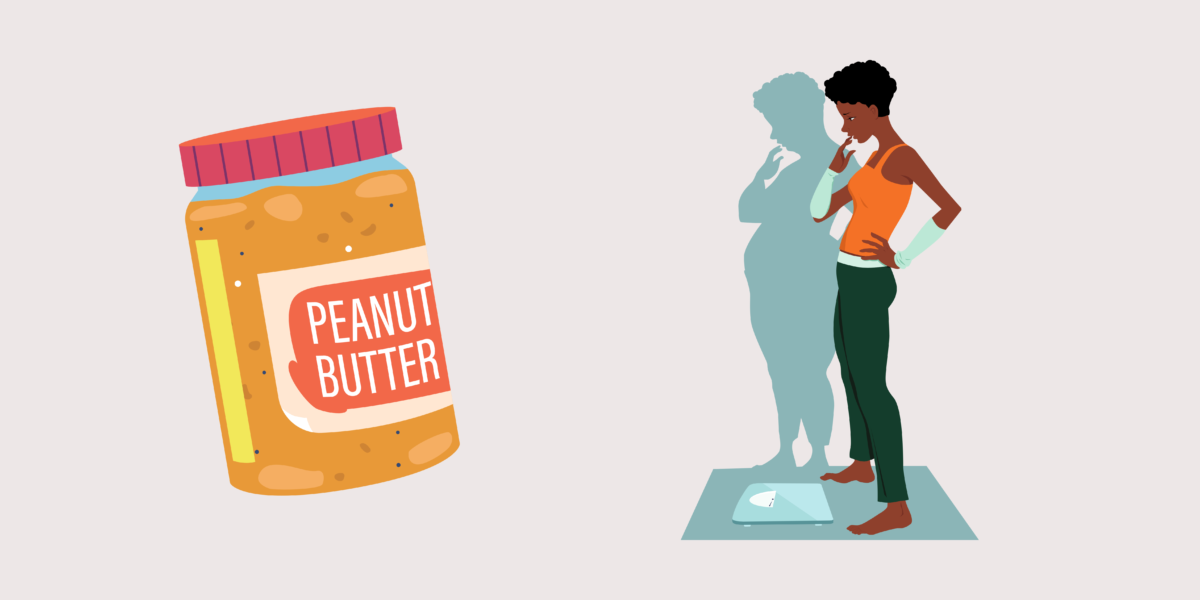
Why Peanut Butter is Good for Weight Loss?
[vc_row][vc_column][vc_column_text]Unlock the Secret to Effortless Weight Loss: Why Peanut Butter Should Be Your Go-To Companion!
In this post, discover the the compelling reasons why swapping your regular butter for peanut butter can supercharge your health journey to shedding those extra pounds of fat. The remarkable protein power to its heart-healthy fats and low-calorie count, peanut butter can be your ultimate friend in the battle against unwanted fat.[/vc_column_text][vc_column_text]
The Goodness of Nuts: What is Peanut Butter?
Peanut butter is made from peanuts. It is the tasty delight that is loved by many. Peanut butter is made by blending dry-roasted peanuts at high temperature into a smooth and delectable butter-like spread.
Although there are many varieties available in the market, choosing the right peanut butter is key for weight loss. Opting for an unsalted or unsweetened variety can help you reduce the excess salt and sugar from your diet and achieve your weight loss goal.
[vc_empty_space height=”4px”]
Peanut butter is healthier than normal butter, made out of dairy. Although it contains fats, these fats are healthy – unsaturated ones. The percentage of saturated fats in peanut butter is very less (10 grams in every 100 grams)
The reason why peanut butter gets a ‘healthy’ tag is a very little processing it undergoes. Only removal of seed coats, followed by roasting and blending into a thin paste.
Hence, peanut butter retains most of its nutritious properties till the final packaged stage and is considered a healthy food.[/vc_column_text][vc_empty_space height=”58px”][vc_column_text]
Nutritional Profile of Peanut Butter
[/vc_column_text][vc_empty_space height=”19px”][vc_column_text]According to the Food Data Central, 100 grams of peanut butter contains the following nutrients,
Energy – 600 Kcal
Proteins – 22.5 grams
Fats – 47.9 grams
Carbohydrates – 22.3 grams
Calcium – 49 milligrams
Iron – 1.73 milligrams
Magnesium – 169 milligrams
Potassium – 564 milligrams
Phosphorous – 339 milligrams
Sodium – 429 milligrams
Copper – 0.42 milligrams
Zinc – 2.54 milligrams
Manganese – 1.68 milligrams
Selenium – 4.1 micrograms
Vitamins – 33.13 milligrams
[vc_empty_space height=”4px”]
Is Peanut Butter Helpful for Losing Weight?
Yes. Peanut butter is helpful for weight loss.
1 tablespoon (16 gms) of peanut butter contains 95.5 calories, according to the US Department of Agriculture. This means, each tablespoon has less than 2 gms of carbohydrates and fewer calories compared to usual butter.
Good source of dietary fibers, protein-rich, low lipid profile, fewer carbs, and antioxidant properties altogether makes peanut butter an excellent food option for weight loss.
Benefits of Peanut Butter for Weight Loss
Here are the reasons why peanut butter is beneficial for weight loss:
1. Presence of Phytosterols
Phytosterols are natural compounds found in plants. These compounds block the absorption of excess cholesterol by the body.
Cholesterol is synthesized by the liver for the proper functioning of cells, production of vitamin D, and some hormones. But too much cholesterol is bad as it triggers obesity, cardiovascular, and metabolic problems.
Luckily, research confirms that peanuts are a storehouse of phytosterols whose cholesterol-lowering property is beneficial. Therefore, peanut butter naturally protects you from unhealthy cholesterol synthesis and prevents obesity.
2. Good Source of Healthy Fats
Butter prepared from peanuts are inherently healthy and contain– oleic acid. These fats are found to cause the feeling of fullness and don’t let you eat excessively.
There is a bioactive compound called oleoyl ethanolamide (OEA) in our small intestine which decreases hunger frequency. Peanut butter is proven to enhance the function of this craving-suppressing bio compound.
The good fats in the butter activates OEA compounds and reduces hunger, or unnecessary cravings, which eventually helps in managing weight.
3. Useful in Weight Management
Peanut butter works wonderfully in long-term weight management. Researchers have verified the ability of peanut butter to lower body mass index in both adults as well as adolescents.
Furthermore, 8 years long research was done by The American Journal of Clinical Nutrition with women participants. This research suggests that women who consumed peanut butter twice a week gained less weight than women who rarely consumed it. Results conveyed the fact that consumption of peanut butter is associated with a lower risk of obesity in mid-aged women.
4. Regulates Blood Sugar Levels
High blood sugar isn’t just the cause of diabetes, it causes obesity as well. Fortunately, peanut butter keeps a check on blood sugar levels too, according to the Department of Nutrition, University of San Antonio Texas.
The glycemic index (GI) value of peanut butter is 14. The foods with GI values in the range of 0-55 are low GI or diabetes-friendly foods. A Low GI score means that when food is digested, it doesn’t cause a sudden release of sugars into the bloodstream, and digestion proceeds gradually.
That’s why incorporating peanut butter with your meals is a good option. It reduces the post-meal spike in blood sugar levels.
How to Use Peanut Butter for Weight Loss?
Adding peanut butter to the daily diet is effortless.
- Add it to a whole grain bread or oatmeal in a morning
- Combine it with your salads
- Blend it with your smoothies
- Eat it along with apples
- Make pancakes with whole-grain flour and spread butter on its top. Enjoy!
Experts suggest keeping a check on portion size while consuming peanut butter.
This is estimatedly a safe calorie intake limit for weight loss. Eating more than 2 tablespoons a day can prove unhealthy and lead to weight gain.
You can further adjust the portion size based on your preferred daily calorie count. But make sure to never exceed the daily limits. Doing this will result in more harm than benefits.
How to Make Peanut Butter at Home?
Peanut butter can be prepared hassle-free at home. Follow these simple steps to make your own homemade peanut butter..
Requirements – peanuts, cooking pan, microwave, any edible oil, airtight jar, salt, and any sweetener(optional).
- Put 250-300 grams of peanuts in a roasting tray and place it inside the microwave at 180-degree Celsius for 10 minutes. Peanuts get roasted super-fast!
- Transfer the roasted peanuts to a pan. Sprinkle some salt
- Keep blending them from time to time until they turn to crumbs. Then, continue blending further. Stop at a stage where peanuts convert to a creamy paste with a gritty texture.
- At this stage, add a few drops of any edible oil you prefer – almond, coconut, olive, or walnut oil.
- Blend the entire paste once again. You will obtain a fine smooth paste. Now, you can add any sweeteners or taste enhancers.
- Finally, extract the butter out of the pan and store it in an airtight jar.
- If you wish for crunchy peanut butter, keep aside a few peanut crumbs at step 3. Add them later with the oil and your butter gets packed with crunchiness.
Which Peanut Butter is the Best in India?
Organic peanut butter with less processing and minimum additives is a good choice. If you ever get confused with so many options while buying, go with the one having the lowest amount of sodium and added sugars.
Concerns Related to Peanut Butter
Despite being a powerhouse of nutrition, peanut butter has some downsides which can’t be ruled out. Below are a few concerns linked to the use of peanut butter.
Allergy
Unlike the USA and other Western countries, the prevalence of peanut butter allergy in India is relatively low.
It is not a strange fact that some people are allergic to nuts. Likewise, peanut butter can also trigger allergic responses in some individuals.
The common symptoms experienced by people having peanut butter allergy are –
- Asthma attacks
- Eczema
- Skin rashes and itching
- Sneezing
- Swollen throat
- Abdominal pains
A minor percentage of the population can even die from the consumption of peanut butter. Anaphylaxis is the most feared outcome of having a peanut allergy. A body releases many chemicals at once which puts a person into severe shock. Although rare, this can be a life-threatening incident.
Hence, it is better to know beforehand if you are sensitive to peanut butter or not.
Aflatoxins
A certain kind of toxin is produced by a fungus called Aspergillus. Peanuts grow underground and are often attacked by aspergillus fungus which grows in close surroundings to them. Studies find that aflatoxins may lead to liver cancer in adults and stunted growth in children.
The extent of toxins in peanuts depends upon local factors like temperature, water, carbon dioxide concentration, and soil conditions. Sometimes, other microbes present in soil reduce the toxin amounts. In some areas, peanuts are grown using biotechnology-led pest management techniques which do not let the fungus grow along with peanut crops.
Further, scientists believe that toxin levels are highly lessened due to the high temperature and slight processing under which peanut butter is made.
Apart from this, FSSAI has set strict standards for the commercialization of peanut butter. This organization keeps a check on the amount of toxicity and other additives in all packaged foods including peanut butter. Similarly, in other countries too, certain government institutions ensure the safe distribution of packaged foods for public use.
The Bottom Line
Peanut butter is helpful in weight loss. It also helps to keep blood pressure, cholesterol, and blood sugar range within safe boundaries. Being a low-carb food with good amounts of proteins and healthy fats, peanut butter is considered good for weight management.
The key approach to weight loss is simple. Burn more calories than you consume. Or, restrict the calorie intake by eating foods rich in fibers, proteins, and relatively less carbs.
Being cautious about ideal calorie count is important. Eating more than that can interfere with your weight loss goals negatively.
Further, be sure you are not allergic to peanuts. And, avoid ones which are loaded with additives.
As long as you follow the right guidelines and consider the checkpoints, peanut butter can expedite your weight loss journey.[/vc_column_text][/vc_column][/vc_row]





No Comments